Here's what happened to everyone after Oppenheimer – to save you going down a Wikipedia rabbit hole
What happened after the credits rolled?
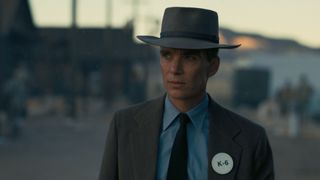
There's no doubt the end of Oppenheimer left you wondering what happened to the main cast of characters – especially since there aren't any pre-credits title cards to fill in the gaps. But no worries, we're here to briefly sum up the lives of Oppy and co. following Oppenheimer's denial of security clearance and the events of Lewis Strauss's trial.
Scroll on to read what happened to the major players in Christopher Nolan's Oppenheimer.
J. Robert Oppenheimer
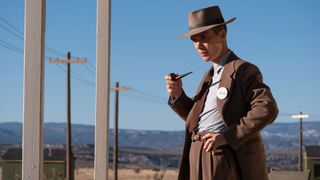
The movie ends on a sour note, with Oppenheimer being denied reinstatement of his security clearance after a rigorous hearing in 1954.
He would make his first public appearance post-hearing later that year, giving a lecture titled 'Prospects in the Arts and Sciences' for the Columbia University Bicentennial radio show Man's Right to Knowledge. Though his 1957 lecture series at Harvard was boycotted by a group of alumni, support for Oppenheimer did not waver. In 1957, France elected him as an Officer of the Legion of Honor. In 1962, he became a member of the Foreign Member of the Royal Society in the UK.
In 1963, President John F. Kennedy awarded Oppenheimer the Enrico Fermi Award (a lifetime achievement award for scientists) after Edward Teller, winner of the 1962 award, had allegedly recommended Oppenheimer receive it, in the hopes that it would heal the longstanding beef and get rid of the bad blood between them (as historian David C. Cassidy claims in his 2005 biography, J. Robert Oppenheimer and the American Century).
A lifelong chain smoker, Oppenheimer was diagnosed with throat cancer in 1965. He fell into a coma on February 15, 1967, and died on February 18 at the age of 62.
On December 16, 2022, United States Secretary of Energy Jennifer Granholm overturned the 1954 decision to deny Oppenheimer's security clearance stating: "In 1954, the Atomic Energy Commission revoked Dr. Oppenheimer's security clearance through a flawed process that violated the Commission's own regulations. As time has passed, more evidence has come to light of the bias and unfairness of the process that Dr. Oppenheimer was subjected to while the evidence of his loyalty and love of country have only been further affirmed."
Sign up to the GamesRadar+ Newsletter
Weekly digests, tales from the communities you love, and more
Kitty Oppenheimer

After their daughter Toni contracted polio, Kitty and Robert flew to the Caribbean in hopes that a warmer climate would help her recover. The family would then build a beach house on Saint John in the Virgin Islands, where they would stay for several months of the year.
Following Robert's death in 1967, Kitty scattered his ashes into the sea off the coast of Saint John. She would then begin a new relationship with physicist Robert Serber (played by Michael Angarano in the film), staying together until her untimely death of an embolism on October 27, 1972 at age 62. Her ashes were scattered near her late husband's (H/T The New York Times).
Lewis Strauss
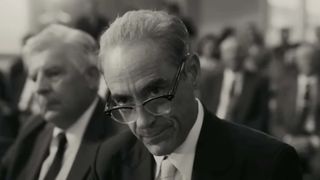
After failing to have his Cabinet appointment confirmed by the Senate in 1959, Strauss immediately resigned from his recess appointment as Commerce Secretary. He published a memoir, titled Men and Decisions, in 1962, which spent fifteen weeks on the New York Times Best Seller list.
No longer part of the government, Strauss devoted his later years to philanthropy, lived on a 2,000 acre farm, and bred cattle. He died of lymphosarcoma on January 21, 1974 after having battled the disease for three years. Strauss was 77 years old.
Isidor Isaac Rabi

After testifying in Oppenheimer's hearing, he served as chairman of the Science Advisory Committee (SAC) of the Office of Defense Mobilization from 1956 to 1957. It was Rabi who pushed for SAC to become President Eisenhower's official committee during the Sputnik crisis, a significant event in the Cold War that led to the creation of NASA. Rabi would then go on to become Eisenhower's Science Advisor. He also led various discussions with the NATO Science Committee that led to the creation of the term "software engineering."
Rabi died of cancer on January 11, 1988, at age 89. According to the book, Rabi: Scientist and Citizen by John S. Rigden, the accomplished physicist was examined during his final days by doctors using magnetic resonance imaging – the very same technology that was developed directly from Rabi's own research. "I saw myself in that machine," he reportedly said. "I never thought my work would come to this."
Leslie Groves
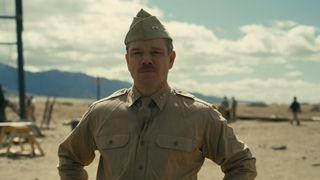
After leaving the military, Groves would become a vice president at former electronics firm Sperry Rand, before officially retiring in 1961. A year later, he published an account of the Manhattan Project titled Now It Can Be Told. That same year, Groves would present General of the Army Douglas MacArthur with the Sylvanus Thayer Award, the night of MacArthur's famous "Duty, Honor, Country" speech to U.S. Military Academy Corps of Cadets at West Point Academy.
Groves died of a heart attack on July 13, 1970 at age 73.
William Borden
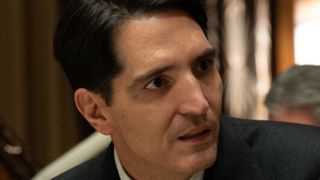
After writing what came to be known in political history as the "Oppenheimer letter" and effectively starting the investigation that would ruin Oppenheimer's career, Borden would never work for the government again. After John F. Kennedy was elected president in 1960, Borden's role in the Oppenheimer hearing would prevent him from getting a position in the new administration.
Borden practiced law in the state of Washington up until his death of a heart attack in 1985.
Edward Teller
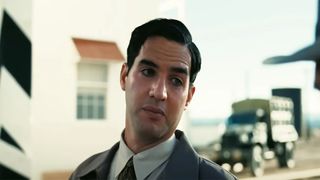
Despite the controversy surrounding Teller's involvement with the Oppenheimer hearing, he moved full speed ahead. The physicist would go on to develop nuclear reactor safety standards, design research reactors that were impervious to nuclear meltdowns, establish the Department of Applied Science at the University of California, Davis, and become one of the first notable scientists to raise awareness about climate change.
In 1979, Teller suffered a heart attack and blamed it on actress Jane Fonda. No, really: Fonda advocated against nuclear power while promoting her disaster film, The China Syndrome, which depicts a nuclear reactor meltdown. Two weeks later, the Three Mile Island accident occurred, resulting in the partial meltdown of the Three Mile Island reactor in Pennsylvania. Teller, spending the weeks following the incident lobbying in defense of nuclear energy and its safety, suffered a heart attack that he claims was due entirely to stress. He would go on to tell The Washington Post (H/T The New York Times) that he was "the only victim" of the accident, saying: "It was not the reactor. It was Jane Fonda."
Teller would also go on to propose things like using nuclear bombs to prevent hurricane damage and using satellites equipped with atomic weapons to fire x-ray lasers at Soviet missiles. He died of a stroke on September 9, 2003, at age 95.
Ernest Lawrence
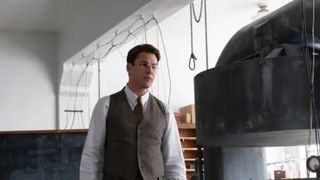
Ernest Lawrence didn't testify in the Oppenheimer hearing due to illness. However, a statement from Lawrence in which he says that Oppenheimer "should never again have anything to do with the forming of policy" was presented at the hearing.
Lawrence would go on to be the first recipient of the Sylvanus Thayner Award in 1958. Later that year, President Eisenhower requested that Lawrence travel to Geneva, Switzerland to help the Atomic Energy Commission (AEC) negotiate a Partial Nuclear Test Ban Treaty with the Soviet Union. A longtime sufferer of ulcerative colitis, Lawrence became gravely ill while in Geneva and was rushed back to the United States. He died in Palo Alto Hospital on August 27, 1958, at age 57.
Oppenheimer is in theaters now. For more, check out the rest of our coverage:

Lauren Milici is a Senior Entertainment Writer for GamesRadar+ currently based in the Midwest. She previously reported on breaking news for The Independent's Indy100 and created TV and film listicles for Ranker. Her work has been published in Fandom, Nerdist, Paste Magazine, Vulture, PopSugar, Fangoria, and more.
Most Popular


